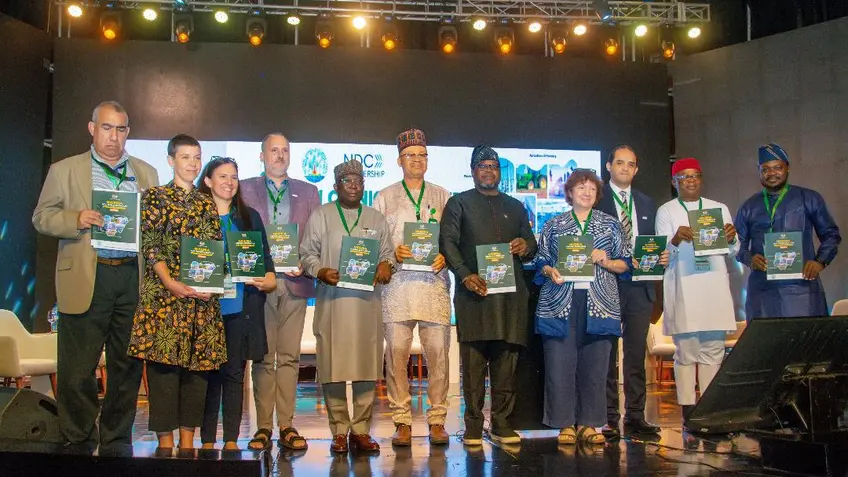Nigeria Launches NDC Implementation Framework to Drive National Climate Action
The Republic of Nigeria unveils its NDC Implementation Framework to drive national climate action and achieve significant emission reductions.
Abuja, Nigeria, May 23, 2024 — The Nigerian government has launched a framework for implementing its Nationally Determined Contribution (NDC) at a high-profile event today hosted by the National Council on Climate Change (NCCC). The launch event convened more than 350 participants from across government ministries, development partners, the private sector, civil society, financial institutions and women's groups.
Speaking at the event, Director-General of the NCCC Dr. Salisu Dahiru recognized the importance of mobilizing the whole of government and whole of society in NDC implementation: “The NDC Implementation Framework is a living document and will be updated with everyone’s participation as Nigeria progresses. It is important that we keep it valid at all times to ensure that we progress together towards sustainable development.”
The Secretary of the Government of the Federation (SGF) George Akume added: “I call on all Ministries, Departments Agencies (MDAs) and subnational governments to prioritize climate finance in their national agenda; on all private sector to see vast opportunities in sustainable investments; the CSOs/NGOs to continually drive progress in advocacy and policy influence; grassroots mobilization and engagement; and the media in public awareness and education. In the same vein, I appeal to the international community to honor their financial commitments and support Nigeria in her journey to a green economy.”
Nigeria's NDC Implementation Framework advances the country’s recently submitted Long-Term Low Emission Development Strategy (LT-LEDS), which seeks to achieve net-zero emissions by 2060. Nigeria's comprehensive Framework is designed to coordinate, mobilize and track the progress towards the national climate targets outlined in its NDC, including reducing emissions by 20% by 2030 compared to a business-as-usual scenario or up to 47% contingent on international support.
The NDC Implementation Framework is structured around 19 outcomes with over 150 outputs and 300 key performance indicators (KPIs) aligned with sectoral action plans and national development goals. The framework is essential to enhance NDC implementation and covers a wide range of priority sectors, including agriculture, forestry and land use, transport, energy, industry, waste and water, as well as cross-cutting components such as capacity building, gender inclusion and monitoring, reporting and verification (MRV).
The NDC Partnership, through the support of the United Kingdom, played a crucial role in assisting the Nigerian government in developing the NDC Implementation Framework. Climate Change and Nature Team Lead Martine Sobey with the British High Commission in Abuja said: “We’re excited to join the launch of this important national investment tool, which will help ensure coordination, transparency, resource mobilization, tracking and reporting of Nigeria’s ambitious NDCs, national climate policies, plans and strategies.”
"The launch of this critical framework represents a key milestone towards achieving Nigeria’s national climate goals in line with the country’s updated NDC and LT-LEDS," said NDC Partnership Director of Country Engagement Mariana Panuncio-Feldman. “Transitioning to a net-zero, climate-resilient economy is a massive effort, and Nigeria cannot meet this challenge alone. The alignment of domestic finance with the country’s own climate and development priorities, and the mobilization of coordinated international support are therefore critical to support Nigeria in delivering its climate targets in line with the country’s development goals.”
For more information on climate action in Nigeria including the latest country documents, please visit the Nigeria country page here.
For media inquiries: Caity Pinkard, Communications Manager, Outreach and Governance, NDC Partnership Support Unit: caitlin.pinkard@ndcpartnership.org
About the NDC Partnership
The NDC Partnership is a global coalition, bringing together more than 200 members, including more than 120 countries, developed and developing, and nearly 100 institutions to deliver on ambitious climate action that helps achieve the Paris Agreement and drive sustainable development. Governments identify their NDC implementation priorities and the type of support that is needed to translate them into actionable policies and programs. Based on these requests, the membership offers a tailored package of expertise, technical assistance, and funding. This collaborative response provides developing countries with efficient access to a wide range of resources to adapt to and mitigate climate change and foster more equitable and sustainable development.
